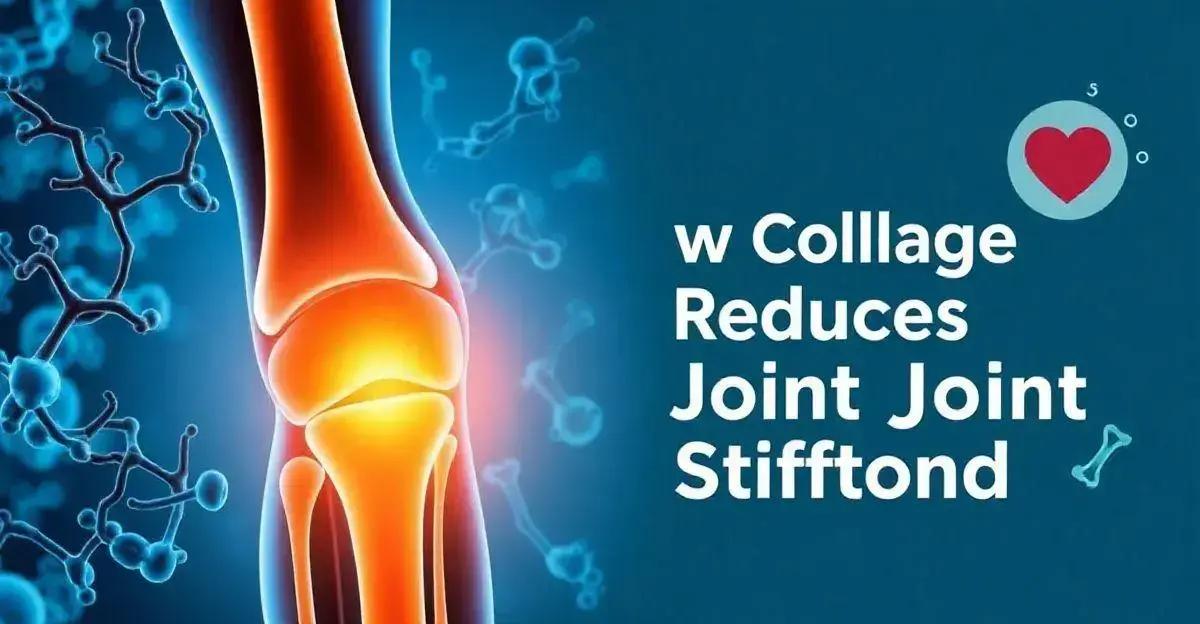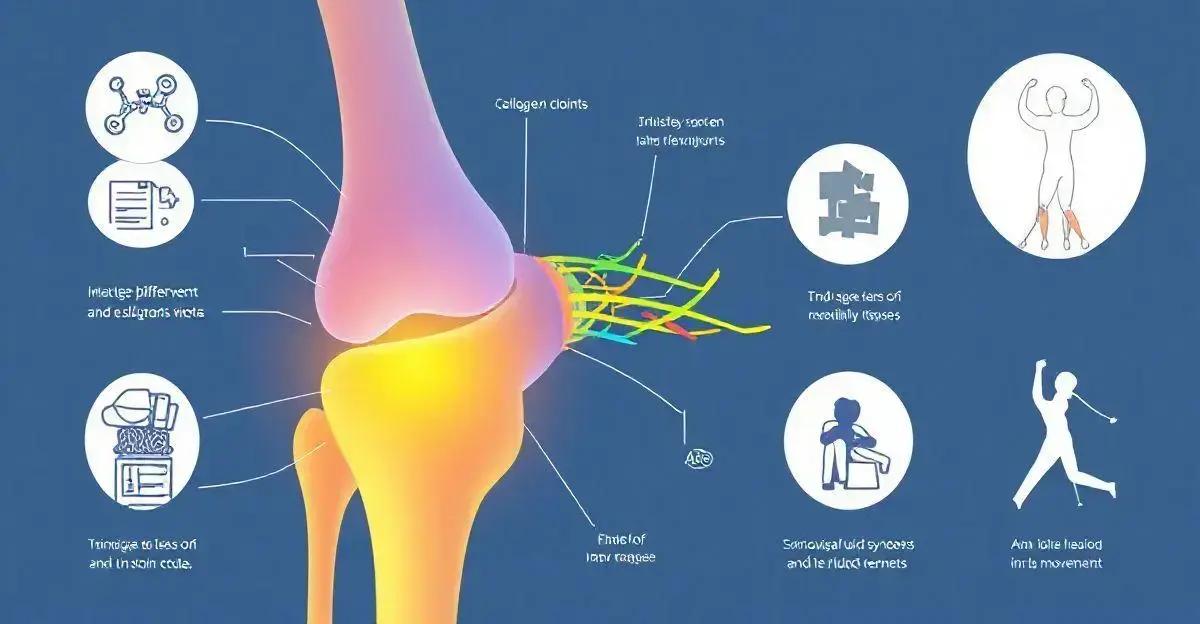Collagen is vital for joint health, helping to reduce stiffness and improve mobility by supporting cartilage regeneration, enhancing lubrication, and lowering inflammation. Type II collagen is especially beneficial for joints. Incorporating collagen through supplements, bone broth, and collagen-rich foods can lead to significant improvements in joint function and overall quality of life.
If you’re dealing with joint stiffness, you might be surprised to learn that collagen could be the answer you’ve been searching for. This essential protein plays a significant role in maintaining healthy joints and can help alleviate stiffness, allowing you to move more freely.
In this article, we’ll explore the numerous benefits of collagen for joint stiffness and how it can contribute to your overall joint health.
What is Collagen and Why is it Important for Joints?
Collagen is the most abundant protein in the body, making up about 30% of total protein content. It serves as a fundamental building block for various tissues, including skin, bones, muscles, and, importantly, joints.
In the context of joint health, collagen is primarily found in cartilage, tendons, and ligaments, where it provides structural support and elasticity.
As we age, our bodies produce less collagen, which can lead to a decline in joint function and an increase in stiffness. This reduced production can result in the deterioration of cartilage, making it less effective at cushioning joints and leading to conditions like osteoarthritis. Consequently, maintaining adequate levels of collagen is crucial for preserving joint health and preventing stiffness.
Collagen plays several vital roles in joint health, including:
- Supporting Cartilage: Collagen is a key component of cartilage, the tissue that covers the ends of bones in joints, allowing for smooth movement.
- Enhancing Flexibility: Collagen contributes to the elasticity and flexibility of joint tissues, which is essential for proper movement and function.
- Reducing Inflammation: Collagen may help reduce inflammation in the joints, a common cause of stiffness and discomfort.
- Promoting Recovery: Collagen supports the repair and regeneration of damaged joint tissues, aiding in recovery after injury or overuse.
Understanding the importance of collagen for joint health can help you take proactive steps to maintain or improve your joint function, ultimately leading to a more active and fulfilling lifestyle.

How Collagen Reduces Joint Stiffness
Collagen is increasingly recognized for its ability to reduce joint stiffness. Here’s how it works:
1. Supports Cartilage Health: Collagen is a major component of cartilage, which cushions the joints. By providing the necessary building blocks for cartilage regeneration, collagen helps maintain its structure and function, reducing stiffness and discomfort during movement.
2. Enhances Joint Lubrication: Collagen contributes to the production of synovial fluid, which lubricates joints. Improved lubrication decreases friction between bones, allowing for smoother movements and less stiffness, especially after periods of inactivity.
3. Reduces Inflammation: Chronic inflammation is a key contributor to joint stiffness. Collagen has anti-inflammatory properties that help alleviate inflammation in the joints, providing relief from stiffness and pain associated with conditions like arthritis.
4. Promotes Flexibility: By maintaining the elasticity of joint tissues, collagen enhances flexibility. This is crucial for reducing stiffness, particularly after exercise or long periods of sitting, making it easier to move comfortably.
5. Aids Recovery: Collagen supports the repair of damaged tissues, helping joints recover from injury or overuse. This recovery process can lead to reduced stiffness and improved overall joint function.
Incorporating collagen into your diet, whether through supplements or collagen-rich foods, can significantly help in reducing joint stiffness, allowing you to enjoy a more active lifestyle without discomfort.
The Role of Collagen in Joint Flexibility
Collagen plays a crucial role in maintaining joint flexibility, which is essential for overall mobility and function. Here’s how collagen contributes to this important aspect of joint health:
1. Structural Support: Collagen provides the structural framework for cartilage, tendons, and ligaments. This support is vital for maintaining the integrity of these tissues, allowing joints to move freely without stiffness or pain.
2. Enhances Elasticity: One of the key features of collagen is its ability to stretch and return to its original shape. This elasticity is particularly important for joint tissues, enabling them to absorb impact and adapt to various movements without becoming damaged or stiff.
3. Facilitates Smooth Movement: Healthy collagen levels ensure that joints can glide smoothly over each other during movement. This is especially important during activities that require bending, twisting, or high-impact actions. Adequate collagen allows for fluid motion, reducing the risk of stiffness.
4. Interconnectivity: Collagen connects various joint structures, including muscles and bones. This interconnectedness helps distribute stress evenly across the joint, enhancing flexibility and reducing the likelihood of injury.
5. Supports Muscle Function: Collagen is not only found in joints but also in muscles. Healthy muscles contribute to joint flexibility by allowing for controlled and coordinated movements. Collagen helps maintain muscle tone and strength, further supporting joint function.
By ensuring that collagen levels are sufficient through diet or supplementation, you can promote better joint flexibility. This can lead to improved performance in physical activities and a reduced risk of stiffness and injury.

Different Types of Collagen for Joint Health
Understanding the different types of collagen is essential for maximizing its benefits for joint health. Here’s a breakdown of the most relevant types of collagen and their specific roles:
1. Type I Collagen: This is the most abundant type of collagen in the body, primarily found in skin, tendons, and bones. While it supports skin elasticity, Type I collagen also provides structural support to joints, contributing to overall joint integrity.
2. Type II Collagen: Type II collagen is specifically found in cartilage and is crucial for joint health. It helps maintain the strength and elasticity of cartilage, making it particularly beneficial for individuals suffering from joint pain and stiffness. Most collagen supplements aimed at improving joint health focus on Type II collagen.
3. Type III Collagen: Often found alongside Type I collagen, Type III collagen is important for the structure of skin and blood vessels. It also contributes to the health of joint tissues by providing additional support to cartilage and ligaments.
4. Type V Collagen: This type of collagen is found in smaller amounts and plays a vital role in the formation of cell surfaces and the structure of hair and placenta. It also contributes to the health of connective tissues, including those found in joints, helping maintain overall joint stability.
5. Type X Collagen: Type X collagen is primarily found in the cartilage of growth plates and is involved in the development and maintenance of joints. It is particularly important for joint development in younger individuals and contributes to overall joint repair.
When choosing collagen supplements for joint health, look for products that contain Type II collagen for targeted support. Some supplements may also combine various types of collagen to provide comprehensive benefits for joint health and function.
How to Incorporate Collagen into Your Daily Diet
Incorporating collagen into your daily diet is easy and can be done in several delicious ways. Here are some effective methods to boost your collagen intake:
1. Add Collagen Powder to Beverages: One of the simplest ways to consume collagen is by adding collagen powder to your favorite drinks. It dissolves easily in coffee, tea, smoothies, or even plain water without altering the taste.
2. Use Bone Broth in Cooking: Bone broth is a rich source of collagen. Use it as a base for soups, stews, sauces, or even cook grains like rice or quinoa in bone broth for added nutrients. You can also enjoy it as a warm drink on its own.
3. Incorporate Collagen-Rich Foods: Focus on including more collagen-rich foods in your meals. Foods such as chicken skin, fish with skin, and egg dishes are excellent sources of collagen. Try roasting chicken with the skin on or enjoying salmon with its skin for maximum benefits.
4. Bake with Collagen: You can easily incorporate collagen into baked goods. Replace a portion of flour in recipes for muffins, pancakes, or cookies with collagen powder to create a nutritious treat.
5. Snack on Collagen-Infused Products: Many brands offer collagen-infused snacks, such as protein bars, gummies, or chips. These can be a convenient and tasty way to increase your collagen intake while on the go.
6. Experiment with Collagen Recipes: Look for recipes specifically designed to include collagen. From energy bites to desserts like collagen chocolate mousse, there are many creative ways to enjoy the benefits of collagen.
By adopting these strategies, you can easily increase your collagen consumption and enjoy the health benefits it offers for your joints, skin, and overall well-being.

Real-Life Success Stories with Collagen for Joint Stiffness
Real-life success stories provide compelling evidence of the effectiveness of collagen in alleviating joint stiffness. Here are some inspiring accounts from individuals who have experienced significant improvements:
1. Anna’s Transformation: Anna, a 52-year-old yoga instructor, had been struggling with stiffness in her knees for years. After incorporating collagen peptides into her daily smoothie, she noticed a marked reduction in stiffness and was able to return to her regular yoga practice, enjoying greater flexibility and ease of movement.
2. Michael’s Experience: Michael, a 60-year-old former athlete, faced chronic joint stiffness due to years of wear and tear. Skeptical but hopeful, he started taking collagen supplements. Within a few weeks, he felt a significant decrease in stiffness, allowing him to engage in activities like hiking and cycling again.
3. Linda’s Journey: Linda, a 45-year-old office worker, often experienced stiffness in her shoulders and hips from long hours of sitting. After adding bone broth to her diet, she reported feeling more mobile and less stiff after work. Linda now enjoys evening walks without discomfort.
4. Tom’s Recovery: Tom, a 38-year-old construction worker, was worried about his stiff joints from heavy lifting. After including collagen-rich foods in his meals, such as chicken skin and fish, he noticed a significant improvement in his joint flexibility and a decrease in stiffness after long workdays.
5. Sarah’s Success: Sarah, a 30-year-old dancer, developed stiffness in her joints due to rigorous training. She started taking collagen supplements and found that her joints felt more flexible and less painful, enabling her to perform at her best without fear of stiffness holding her back.
These success stories highlight the potential benefits of collagen for joint stiffness. Whether you’re struggling with chronic stiffness or simply looking to support your joint health, these individuals’ experiences serve as encouraging reminders of what collagen can achieve.
Conclusion
In conclusion, collagen plays a vital role in alleviating joint stiffness and promoting overall joint health.
By supporting cartilage regeneration, enhancing flexibility, and reducing inflammation, collagen can significantly improve your mobility and quality of life.
Real-life success stories demonstrate the transformative effect collagen can have on individuals dealing with joint stiffness, inspiring others to explore its benefits.
Incorporating collagen into your daily diet through supplements, bone broth, and collagen-rich foods is a practical approach to ensuring you maintain healthy joints.
As you consider strategies for managing joint stiffness, remember that consistency is key.
By making collagen a regular part of your routine, you can enjoy a more active lifestyle free from discomfort.
Take the first step toward healthier joints by exploring the various ways to incorporate collagen into your diet and experience the difference it can make in your life!
FAQ – Frequently Asked Questions about Collagen for Joint Stiffness
How does collagen help reduce joint stiffness?
Collagen helps reduce joint stiffness by supporting cartilage health, enhancing joint lubrication, and reducing inflammation in the joints.
What types of collagen are most effective for joint health?
Type II collagen is particularly effective for joint health, as it is primarily found in cartilage. Type I and Type III collagen also contribute to overall joint support.
How long does it take to notice changes after starting collagen supplements?
Many individuals report noticing improvements in joint stiffness and mobility within 4 to 8 weeks of consistent collagen supplementation.
Can I get enough collagen from my diet alone?
Yes, you can obtain collagen from foods like bone broth, chicken skin, fish with skin, and egg dishes, but supplements can provide a concentrated source.
Are there any side effects of taking collagen supplements?
Collagen supplements are generally safe, but some individuals may experience mild digestive discomfort. Serious side effects are rare.
Can collagen help with other joint issues besides stiffness?
Yes, collagen can also help with joint pain and overall joint health by providing the necessary support for cartilage and reducing inflammation.


